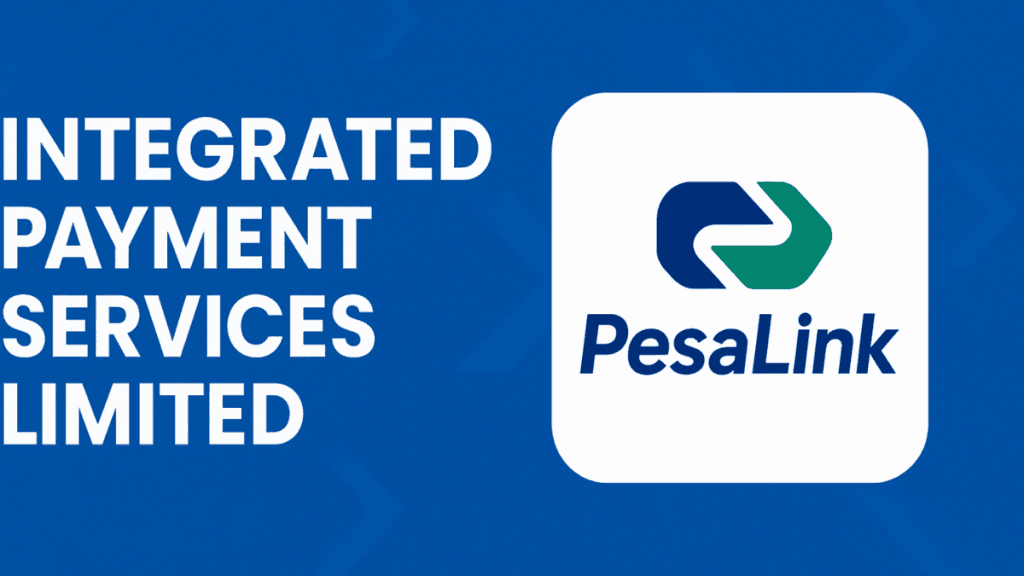Integrated Payment Services Limited (IPSL) is a key player in Kenya’s payments ecosystem. As the operator of PesaLink, IPSL enables real-time interbank money transfers, offering secure, instant payments across banks, fintechs, SACCOs, and mobile platforms.
It was founded under the Kenya Bankers Association (KBA) in 2015. IPSL was created with a mission to solve the challenge of inter-bank money transfers, bringing interoperability and efficiency to Kenya’s financial sector.
Origins and Governance
Why IPSL Was Created
- Under the National Payment System (NPS) Act, IPSL was established to operate the retail payment infrastructure in Kenya.
- Its goal is to Provide a fast, reliable, and interoperable real-time payments network that works across different financial institutions.
Leadership
- Gituku Kirika is IPSL’s CEO, bringing in deep fintech and banking experience.
- The company is owned by the Kenya Bankers Association (KBA), positioning it at the heart of Kenya’s banking infrastructure.
Regulation and Licensing
- IPSL is a licensed Payment Service Provider (PSP) under the Central Bank of Kenya.
- It meets regulatory standards to operate a national payments infrastructure.
What Is PesaLink?
PesaLink is the flagship product operated by IPSL. It’s a real-time, always-on payment rail that allows users to transfer money instantly between bank accounts and other connected financial platforms.
Key Features:
- Transfers are processed 24/7/365 — including nights, weekends, and public holidays.
- Transaction limits: Users can send money from as little as KSh 10 up to KSh 999,999.
- PesaLink is “open” and interoperable: It connects banks, fintechs, mobile money wallets, SACCOs, and more.
- Access channels include mobile banking apps, USSD, internet banking, ATMs, and agency banking.
Modernization and Technology
ISO 20022 Upgrade
IPSL modernized its real-time payments platform, migrating to an ISO 20022-based infrastructure. This upgrade is significant: it aligns Kenya with global messaging standards for instant payments.
- The new system uses a micro-services architecture, enabling scalability and stronger performance.
- It also supports enriched data in payments — useful for better compliance (KYC, AML) and more innovative use cases.
Interoperability
- Legacy systems (using older messaging protocols) are bridged to the new ISO 20022 standard via solutions like XMLdation’s Bridge.
- The modernization enhances IPSL’s ability to onboard fintechs, PSPs, and mobile operators more easily, expanding the reach of PesaLink.
Impact and Growth
Transaction Volumes
- According to the Kenya Bankers Association’s 2023 annual report, IPSL saw explosive growth: a 78% increase in transaction volumes compared to December 2022.
- This reflects rising adoption of instant account-to-account payments in Kenya, positioning IPSL as a major driver of digital payments.
Ecosystem Expansion
- Over 27 fintech firms are now integrated with PesaLink, thanks to partnerships fostered by IPSL.
- This integration model supports use cases beyond person-to-person transfers: merchant payments, bill settlement, and pull payments are all growing.
Consumer Behavior
- A survey referenced by IPSL found that many users of PesaLink are multi-banked and value speed and convenience above all.
- Security, low fees, and privacy also rank high among user concerns, emphasizing that trust is central to IPSL’s value proposition.
Risk Management and Settlement
- IPSL has controls in place: transaction limits help mitigate liquidity risk, and settlement happens via real-time gross settlement (RTGS) through Kenya’s central bank system.
- The system is designed for high availability, with uptime often cited at 99.99%, ensuring reliability for users.
- For regulatory and compliance risk, enriched data via the ISO 20022 standard supports stronger anti-money laundering (AML) and “know your customer” (KYC) practices.
Why IPSL Matters
- Financial Inclusion
By providing a real-time interbank payment platform, IPSL helps bring more people into the formal financial system. Fintechs, SACCOs, and even mobile money services can plug into PesaLink, making payments more inclusive. - Efficiency and Speed
Instant payments make business more efficient: individuals and businesses don’t wait days for money to clear. For many Kenyans, this reduces friction in cash flow. - Innovation Enablement
With its modern infrastructure, IPSL can support new payment models. Fintechs can build on top of PesaLink to offer value-added services, such as merchant payments, automated billing, and pull-based transactions. - Resilience & Trust
A regulated, robust, and modern payments system increases trust in the banking ecosystem. The ISO 20022 upgrade and high uptime further strengthen system reliability.
Challenges and the Road Ahead
- Scaling further: While PesaLink has grown impressively, pushing its reach deeper into underbanked segments and rural areas remains an important frontier.
- Interoperability with mobile money: Although PesaLink connects to fintechs and wallets, greater alignment with dominant mobile money platforms could accelerate real-world usage.
- Cross-border ambitions: As the world leans more into real-time cross-border payments, IPSL could explore partnerships beyond Kenya to support regional or continental instant transfers.
- Sustaining security: With enriched data and more transaction volume, IPSL must continue investing in cybersecurity, fraud detection, and regulatory compliance.
Conclusion
Integrated Payment Services Limited (IPSL) is a foundational pillar in Kenya’s payments infrastructure. As the operator of PesaLink, it delivers fast, reliable, and interoperable real-time payments. Its modernization to ISO 20022 positions Kenya at the forefront of payments innovation in Africa. Through thoughtful governance, strong partnerships, and a clear vision, IPSL is redefining how money moves in Kenya — for businesses, individuals, and the entire financial ecosystem.
If you’re a fintech, a business, or a developer interested in integrated payments, IPSL and PesaLink represent a powerful, trusted, and forward-looking option.
